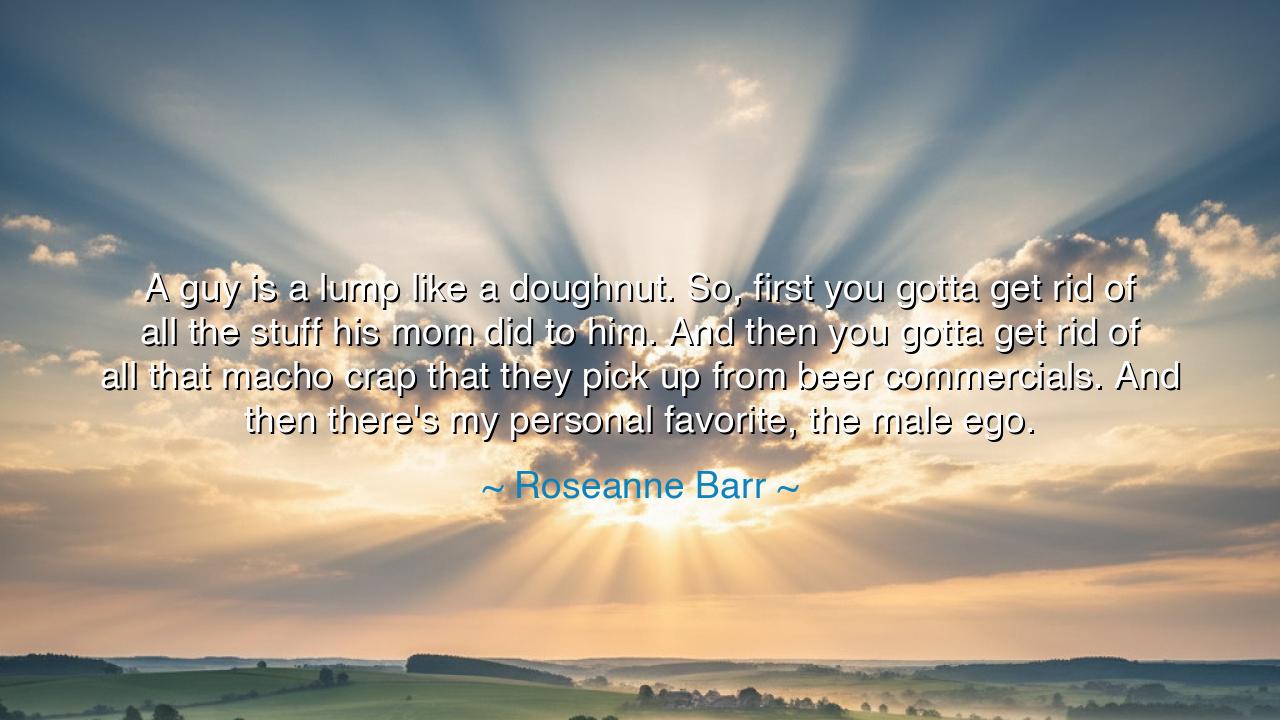
A guy is a lump like a doughnut. So, first you gotta get rid of
A guy is a lump like a doughnut. So, first you gotta get rid of all the stuff his mom did to him. And then you gotta get rid of all that macho crap that they pick up from beer commercials. And then there's my personal favorite, the male ego.






“A guy is a lump like a doughnut. So, first you gotta get rid of all the stuff his mom did to him. And then you gotta get rid of all that macho crap that they pick up from beer commercials. And then there's my personal favorite, the male ego.” — Roseanne Barr
In this sharp and humorous declaration, Roseanne Barr speaks with the wit of a jester and the wisdom of an oracle. Her words, though playful, strike deep into the heart of human nature and the making of men. When she calls a man a “lump like a doughnut,” she is not casting scorn but unveiling truth through jest — that many souls, especially those shaped by the forces of expectation, are raw, unformed, layered with the residue of upbringing, culture, and pride. The doughnut, soft and malleable, symbolizes potential — the potential for goodness, for tenderness, for love — but also the danger of emptiness when that potential is never awakened.
Barr’s insight reaches beyond gender; it touches the ancient struggle between who we are born as and what the world molds us to be. In her words, the “stuff his mom did to him” represents the inherited burdens of childhood — the beliefs, fears, and expectations pressed into the soul before it could defend itself. Every man carries within him the echo of his first home: his mother’s hopes, her worries, her lessons, her wounds. The ancients knew this truth well. The Greeks spoke of Orestes, tormented by his mother’s shadow, driven to madness until he could confront the past and reclaim his own will. So too must every man face the ghosts of nurture, learning which parts of his inheritance serve him and which must be cast away.
And then Barr speaks of “that macho crap they pick up from beer commercials.” Here, the humor sharpens into social truth. She reveals the false gods of modern manhood — those glittering idols of strength without compassion, dominance without wisdom, swagger without soul. The ancients had their own version of these myths: the warriors who mistook cruelty for courage, or the kings who ruled by fear instead of justice. Yet in every age, there are teachers who remind us that true strength lies not in noise, but in restraint. The stoic Marcus Aurelius, emperor of Rome, once wrote that the man who conquers himself is greater than he who conquers nations. Barr’s “beer commercials” are the modern empire’s chorus — whispering lies that might makes right. But the wise will see through them.
Then she delivers her final blow — “the male ego.” Here lies her “personal favorite,” for it is the final and most formidable barrier. The ancients would have called it hubris — the pride that blinds kings, topples empires, and destroys hearts. The ego is the fortress built from fear, defending the fragile self from truth. Yet as every sage has taught, only by breaking that fortress can the soul be free. To strip away the ego is to let humility, vulnerability, and love take their rightful place. Barr’s tone may be comic, but her wisdom is fierce: beneath every “lump like a doughnut” is a man capable of depth and grace, if only he dares to shed his armor.
Consider the tale of Hector of Troy, noble and brave. Though a warrior, he fought not for pride but for peace, not to prove himself but to protect his people. In him, the ancients saw what Barr demands of modern men: the balance between strength and tenderness, courage and conscience. Yet Hector, too, was destroyed by the world’s worship of ego — the endless cycle of vengeance and glory that consumes even the good. Thus, Roseanne’s jest reminds us that without self-knowledge, even the noble become slaves to illusion.
The lesson, then, is not only for women seeking to understand men, but for all humanity. Every soul must undergo the stripping-away, the sacred unmaking of illusion and pride. We must unlearn what the world teaches — the false identities, the hollow bravado — to find the quiet truth beneath. Like sculptors, we must chip away the marble that hides the living form within. For the wise know: to love another truly, one must first remove all that is not real in oneself.
And so, let the listener take heed. Laugh, yes, at Roseanne’s jest — for laughter, too, is a weapon of truth — but listen beneath the laughter. To the men: do not fear the peeling away of layers; it is not destruction, but becoming. To the women: see beyond the lump, and guide, not with scorn, but with patience and fire. To all: remember that every person is shaped by unseen forces — by family, by society, by pride — yet each carries within a spark untouched by these. It is that spark, humble and enduring, that must be freed.
For in the end, Barr’s humor conceals a sacred truth of the ancients: that the path to wisdom is the art of unlearning. Whether man or woman, we are all dough beneath the divine hand — and only through the heat of truth and love can we rise into our truest form.






AAdministratorAdministrator
Welcome, honored guests. Please leave a comment, we will respond soon